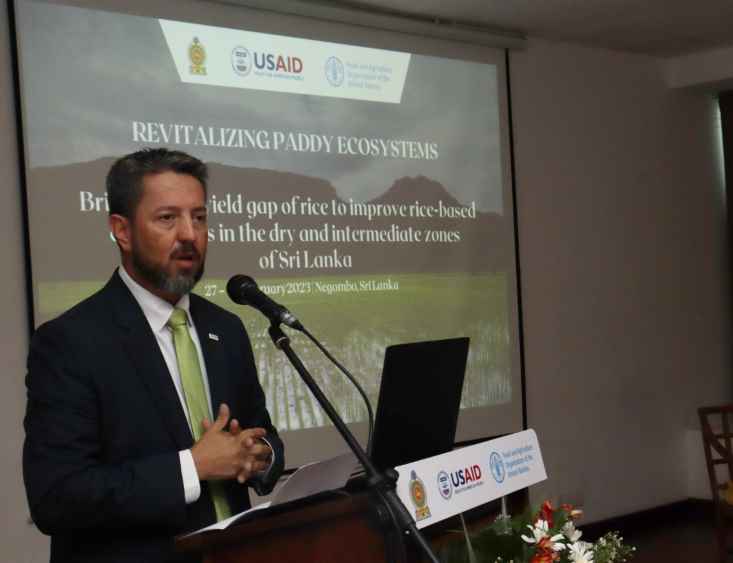
COLOMBO, 2 March 2023 – The Food and Agriculture Organization of the United Nations (FAO), in collaboration with the United States Agency for International Development (USAID), is working together with the Ministry of Agriculture to increase the productivity and resilience of the rice-based ecosystems in the Dry and Intermediate Zones of Sri Lanka.
Seventy-five percent of the 890,000 hectares of agricultural land used for Paddy farming in Sri Lanka is under smallholder farmers. Despite the country’s potential, the productivity in major growing ecosystems in Sri Lanka (the Dry and Intermediate Zones) has been stagnant or declining over the last 10 years. This is in contrast to the increase in productivity seen in other paddy-growing countries in Asia.
If paddy productivity is increased by just 10 percent in the Dry and Intermediate zones, Sri Lanka will produce an extra 0.5 million tonnes. If more productive and efficient farming techniques are introduced, then productivity can be increased with less water and chemical inputs, and more cost-effectively. More efficient farming can also release approximately 100,000 hectares of land for other field crops and reduce the country’s reliance on imports.
FAO, USAID, and the Ministry of Agriculture’s Department of Agriculture are developing a plan of action to increase the paddy productivity of the Dry and Intermediate Zones. FAO held an initial workshop this week with experts and stakeholders from the International Rice Research Institute, Manila (IRRI), the government, academia, agriculture scientists, civil society, and the private sector. Attendees developed a roadmap to create an enabling environment and to increase farmer access to technology and skills required to boost paddy productivity.
Speaking to the attendees, the USAID Mission Director for Sri Lanka and Maldives, Gabriel Grau, noted, “Collaboration between the Ministry of Agriculture, the Private Sector, FAO, and USAID is more than about increasing food security in Sri Lanka. Our combined long term objective is to transform Sri Lankan agriculture from subsidy-driven to market-based, private sector driven, competitive agriculture. To achieve this, new technologies, more efficient systems, and the long term commitment of all stakeholders in the agriculture sector will be critical.”
Commenting on the initiative, Secretary to the Ministry of Agriculture, Mr Gunadasa Samarasinghe stated, “The Ministry is committed to improving food security for Sri Lanka, and in order to achieve this we need to reduce our dependence on imports while stabilizing the rice market with increased production and buffer stocks. The plan of action developed through this initiative and the valuable support of FAO and USAID will help us achieve this goal.”
“Technology will never replace the farmer, but the farmer with technology will – and should – replace the farmer without. Smallholder farmers are the backbone of Sri Lanka’s agriculture sector and through this initiative, we are hoping to equip as many smallholder paddy farmers with the technology and skills required to increase their productivity and profit while utilizing less land and inputs. Through the support of the Ministry of Agriculture, USAID, and smallholder paddy farmers, this plan of action could set Sri Lanka firmly on the path to becoming a food-secure nation.” stated Mr Vimlendra Sharan, FAO Representative for Sri Lanka and the Maldives.
The recommendations developed through the workshop will be presented to the Minister of Agriculture, Hon. Mahinda Amaraweera within two weeks to be taken forward with the continued support of FAO and USAID.


